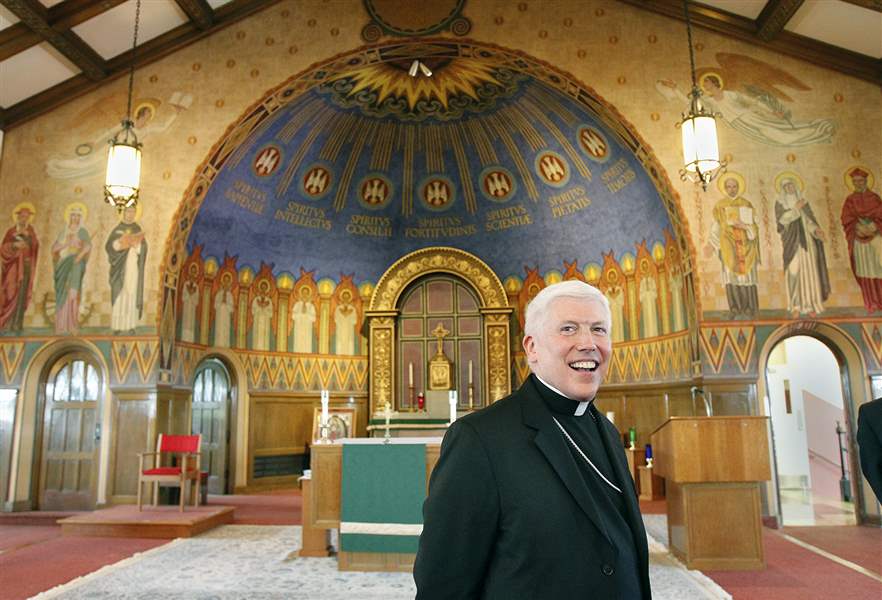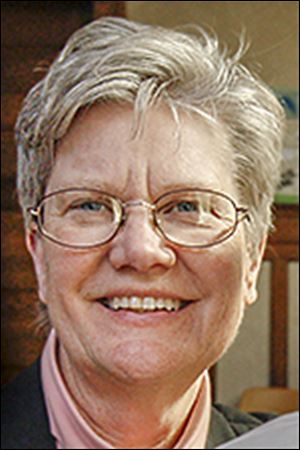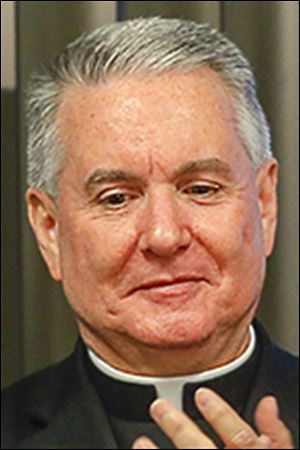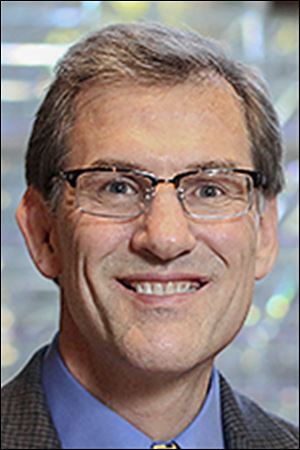
A journey of faith leads cleric to Toledo
New bishop looks forward to shepherding area flock
10/19/2014
On Wednesday, the Most Rev. Daniel E. Thomas will be installed as the eighth Roman Catholic bishop of the Toledo Diocese.
THE BLADE/JUSTIN WAN
Buy This Image

On Wednesday, the Most Rev. Daniel E. Thomas will be installed as the eighth Roman Catholic bishop of the Toledo Diocese.
PHILADELPHIA — The next bishop of the Toledo Diocese, the Most Rev. Daniel E. Thomas of Philadelphia, knows who he is.
“I am a parish priest, [and] each parish priest, each pastor, is the father of faith of the parish.”
And he knows what he is to do.
“What Pope Francis is modeling each one of us wants to model. And, of course, we want to model Jesus.”
And his theology?
“Every single person is a child of God. ... Each person has the dignity of God because they’re created in the Lord’s image and likeness.”
Bishop Thomas, 55, recently agreed to a wide-ranging interview with The Blade at Philadelphia’s Archdiocesan Pastoral Center in preparation for his 2 p.m. installation Wednesday at Our Lady Queen of the Most Holy Rosary Cathedral near downtown Toledo. He now serves as an auxiliary bishop of the Archdiocese of Philadelphia.
Bishop Thomas will be the eighth Roman Catholic bishop of Toledo since its founding in 1910. Before that, it was part of the Archdiocese of Cincinnati and the Diocese of Cincinnati, formed in 1821.
First on his agenda after his installation will be a tour of the Toledo diocese to meet his new flock.
He plans to dedicate time between now and Christmas to visit every one of the diocese’s 15 deaneries, or regional districts. He will get acquainted with priests and parishioners throughout the 19-county diocese, his see. Bishop Thomas said he will start with the deaneries the farthest away from his new home of Toledo.
“The hope is that as we move closer to snow season, that means we get closer and closer to the center of the see,” he said, “and therefore have a greater opportunity, please God, of not having our things canceled by weather.”
Faithful await
In each deanery, Bishop Thomas said, he will preach a homily at an evening prayer service, and there will be a reception after, where “all the people who are there will have an opportunity to meet and greet me, or for me to meet and greet them.”
And his flock wants to meet him.

Welsh
“I’m eager to meet him and to share my hopes and dreams for our diocese with him,” said Sister Virginia Welsh, a Tiffin Franciscan who is pastoral leader at St. Martin de Porres in Toledo and director of its Padua Center. “I hope that he listens and heals, and that he remembers that love is more important than rules and regulations.”
“I hope he is pastoral and models his ministry on that of Pope Francis, who reaches out to all people, especially those who are economically poor, and reaches [out] to all those in need or marginalized,” Sister Virginia added.
Listening to Bishop Thomas, one senses a certain kinship with Pope Francis.
“I would hope that I would be able to be a holy, ardent bishop for the people. To reach out, first of all, to my flock — that is, Jesus’ flock — of Catholics in the whole region,” Bishop Thomas told The Blade. “Also, to reach out to those who are not Catholic, to the unchurched, those of different faiths, those of different ecumenical confessions. And I would hope to be a bishop who lays down his life for his sheep.”
The bishop’s work

Kubacki
Msgr. William Kubacki, the moderator of the diocesan curia, or governing body, knew Bishop Thomas through mutual priest friends before he was appointed to Toledo.
“I look forward to working with him” in the chancery, Msgr. Kubacki told The Blade when Bishop Thomas was introduced at the Catholic Center on Aug. 26. “I think that I’m going to be the one who’s going to have to share with him a lot of what’s happening here in the diocese and keep him updated, and help him make some decisions.”
“He has some really big challenges ahead of him, some things that need to be addressed, and things that need to be looked at,” said the Rev. Thomas Doyle, vice president for Jesuit identity at St. John’s Jesuit High School. “We’re really hopeful that he’ll be part of the solutions for problems.”
Rev. Charles Ritter, the diocesan administrator who will hand over the diocese to Bishop Thomas on Wednesday, said, “I think the primary issue is simply the time that it takes for him and the rest of us to get to know one another.” With Bishop Thomas coming from Philadelphia, “to automatically expect him to be immediately on our wavelength, as it were, is unfair.”
Bishop Thomas said Toledo’s diocesan pasture would be affirming to him as a spiritual shepherd. He said his comment about laying his life down for his flock means that he doesn’t intend to be passing through Toledo.
Of the seven previous bishops of Toledo, four were moved to other sees, with the Most Rev. Samuel Stritch moving twice — becoming archbishop of Milwaukee and then of Chicago and being named a cardinal in 1946. Bishop Thomas’ immediate predecessor, the Most Rev. Leonard Blair, was named archbishop of Hartford, Conn., in December, 2013.
Through his work at the Vatican, Bishop Thomas learned bishops’ ways. He was an official in the Congregation for Bishops for 15 years.
“The work entails caring for pastoral governance of bishops throughout the world,” he said. “It entails assisting the Holy Father to choose bishops for dioceses around the world. It entails the establishment of dioceses, the erection of cathedrals. It entails the selection and nomination of all [bishops].”
The relationships and exposure to Catholic hierarchy might have helped Bishop Thomas be identified as a potential bishop, but it was not his intentional path. When he left the Vatican, he returned home to be a parish priest, “which I studied to do in the first place.”
The pastor’s life
Home very much is Philadelphia. That’s where he was born.
Bishop Thomas received a Philadelphia-area Catholic education from elementary school through a seminary master’s degree, and Philadelphia is where he was ordained a priest in 1985 and a bishop in 2006.
In parish ministry, he was parochial vicar of St. Joseph Parish in Aston, Pa., from 1985 through 1987, then pastor of Our Lady of Assumption Parish in Strafford, Pa., from October, 2005, through June, 2006. Between those assignments, he received an advanced degree in dogmatic theology from Pontifical Gregorian University in Rome, then went to work for the Congregation for Bishops, and also gave spiritual direction at the Pontifical North American College Seminary in Rome.
“I was delighted to come home as a parish priest, as a pastor,” Bishop Thomas said. “I would say I am a parish priest. Now I’m simply the father of the family of faith of a larger group of people but, I hope, please God, no less a pastor or a parish priest of the faithful.”
Bishop Thomas’ thoughts of being a priest go back at least to age 7.
“Over time, in my mind and heart and through the example especially of seeing priests serve in joyful, faithful ministry, it became ... that this might be what the Lord is calling me to,” he said.
Bishop Thomas answered that call and now is “looking for heaven,” and he wants “to bring as many people with me as I can.”
The priest’s teaching
As he looks to heaven, Bishop Thomas will be involved with social issues on Earth.

Feldmeier
Peter Feldmeier, the Murray/Bacik chairman of Catholic studies at the University of Toledo, said of Bishop Thomas: “He didn’t strike me with what he said [when he was introduced to the diocese in August] as being preoccupied with the culture wars, but he does seem preoccupied with the social ministry of the church.”
Bishop Thomas’ comments about his new flock seem to affirm that view: “All the Catholic social services reach out and care for every single person no matter race, creed, sexual identity, anything. It’s the care for the person, because that’s what we believe Jesus would do.”
To Bishop Thomas, Christian care is for all: “Every single person is a child of God, so no matter their sexual preference, they are children of God, and the church is very clear through the catechism and through her teaching — her constant teaching — that each person has the dignity of God because they’re created in the Lord’s image and likeness.”
But Bishop Thomas also upholds church teaching.
“Obviously, we have a profound respect for the dignity of every human person,” he said. “We also believe that sexual union is intended for marriage, and that it is within the sacred context of marriage that sexual union is not only both proper, but then also life-giving, not only to the spouses but also to bear the fruit of children.
“So, the reality is we have a teaching that the body means something, that bodily sexuality is an expression of masculinity or femininity and that, in the end, we are created for a purpose. So while we respect people’s opinion, it’s that classic understanding — we ask the same respect of what we believe and of what we teach so, while we respect people, at the same time we cannot endorse something which we ourselves do not believe.”
On the role of women in the church, Bishop Thomas said: “Consecrated life, and especially consecrated life of women religious in the church, has been for centuries a tremendous gift to the church. ... But I guess what we have to say is, are people looking for something that is simply not Catholic?
“Even Pope Francis recently has reiterated that this question of women’s ordination is a nonquestion because the reality is it’s been the teaching and the dogma of the church for centuries. Pope John Paul II finally and firmly defined it, and Pope Francis himself has said that that’s a closed door, that’s not something that we do because it’s not what Jesus desired or planned for his church,” Bishop Thomas said.
On the broad issues of family life, Bishop Thomas can look to Philadelphia, where the World Meeting of Families will take place in September. Pope Francis might be there.
“I sure do hope that I might be able to lead a pilgrimage from Toledo to Philadelphia for that event,” Bishop Thomas said. “I would hope that I’d have families together with me and come and be physically present, even though I myself will also be a pilgrim in Philadelphia.”
Meaning that for Bishop Thomas, his home is now Toledo.
Contact TK Barger @ tkbarger@theblade.com, 419-724-6278 or on Twitter @TK_Barger.